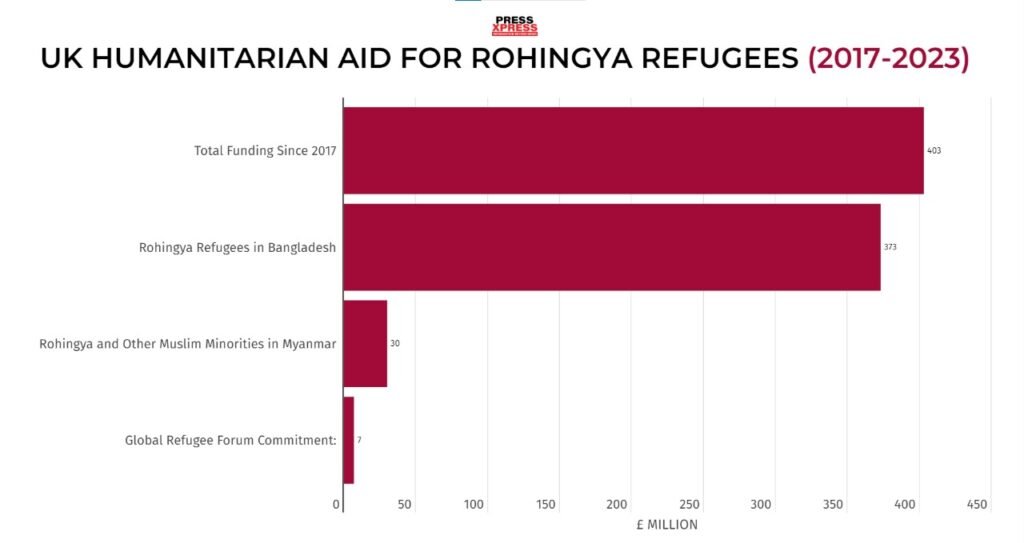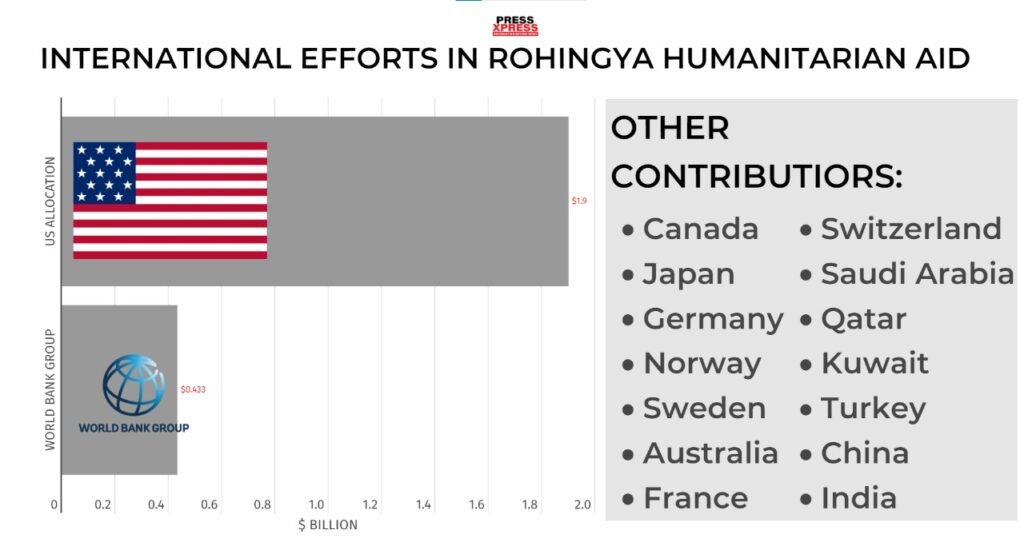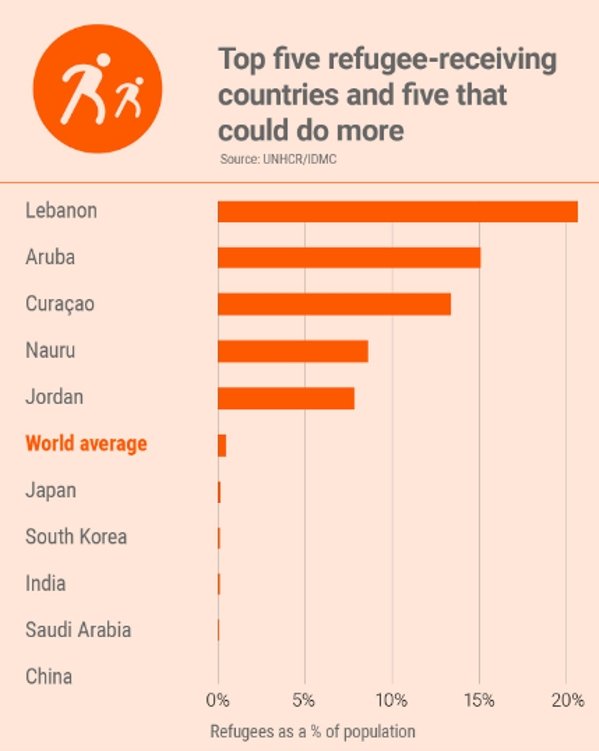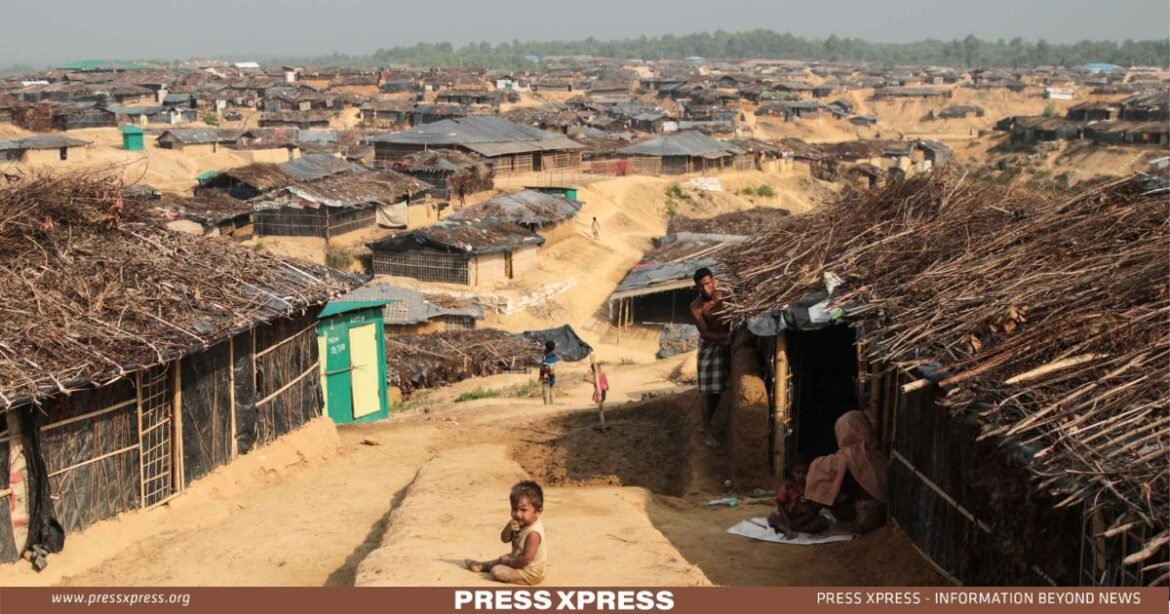Key highlights:
- Bangladesh is constantly vigilant and has been engaging with the Myanmar government and the international community to seek a lasting solution to the crisis
- Since 2017, the UK delivered more than £373 million in funding for Rohingya refugees in Bangladesh and more than £30 million for Rohingya and other Muslim minorities in Myanmar
- The United States has allocated over $1.9 billion in humanitarian aid for Rohingya refugees in Bangladesh
- The World Bank Group has pledged $480 million in grants to address the needs of Rohingya refugees
Bangladesh’s Foreign Minister Dr Hasan Mahmud on 27 January 2023 reiterated his call for the international community to exert pressure on Myanmar to take back the Rohingya refugees who have been living in camps in Cox’s Bazar since 2017. He said that the repatriation of the Rohingyas to their homeland in Rakhine state is the only solution to the humanitarian crisis that has created many troubles for Bangladesh. Dr Mahmud made these remarks after he met with a visiting British cross-party delegation, led by Conservative MP Paul Scully.
You can also read: PM Hasina Woos British Investors with Exclusive Zone!
He further briefed the delegation about the challenges faced by Bangladesh due to the influx of more than 1.1 million Rohingya refugees, who fled a brutal military crackdown in Myanmar in 2017. He said that Bangladesh has been hosting the Rohingyas on humanitarian grounds, but the situation has become unsustainable and poses security and environmental risks for the country.

Associate Professor Department of Law
Jagannath University
Addressing the imbalance in refugee hosting responsibilities is a complex challenge, but the global community can explore several avenues:
Strengthening international framework:
Revisiting the 1951 Refugee Convention: Update the legal framework to better reflect current refugee realities, clarify responsibilities, and encourage wider participation.
Global responsibility-sharing framework: Develop a quota system or similar mechanism based on factors like national capacity, GDP, and population density.
Regional compacts: Foster regional agreements where neighboring countries share hosting responsibilities, create safe havens, and provide coordinated responses.
Enhancing support for frontline states:Increased financial and logistical aid: Provide robust financial support for frontline states to manage refugee influx, integrate them into society, and invest in infrastructure.
Capacity building: Offer training and expertise for frontline states in areas like refugee administration, healthcare, and education.
Resettlement programs: Facilitate resettlement opportunities in non-frontline countries to ease pressure on hosting nations.
Promoting burden-sharing among all nations:Public awareness campaigns: Increase public understanding of the refugee crisis and encourage more nations to participate in burden-sharing.
Private sector engagement: Engage businesses and civil society organizations in supporting refugee communities and creating economic opportunities.
Visa and asylum policies: Harmonize visa and asylum policies across nations to create more equitable access to safety and legal pathways.
Addressing root causes of displacement:Conflict resolution and peacebuilding: Invest in conflict prevention and peacebuilding efforts to address the root causes of displacement and reduce refugee flows.
Sustainable development: Support development efforts in vulnerable regions to improve living conditions and reduce the risk of forced migration.
Climate change mitigation and adaptation: Address climate change to prevent environmental displacement and support resilient communities.
Remember:No single solution exists, and a multi-pronged approach is crucial.
Addressing political and economic interests of all stakeholders is essential for cooperation.
Fostering dialogue and collaboration between governments, NGOs, refugees, and local communities is key.
Ultimately, addressing the imbalance in refugee hosting responsibilities requires a global commitment to shared responsibility, solidarity, and long-term solutions. By implementing these strategies and acknowledging the complexity of the issue, the international community can strive towards a more equitable and humane response to the global refugee crisis.
Rohingya refugees in limbo as Myanmar turmoil stalls return process

Dr Hasan Mahmud stated that Myanmar’s internal turmoil has negatively affected the repatriation process, which has been on hold since 2018 because of Myanmar’s lack of cooperation and the Rohingyas’ unwillingness to return without citizenship, security, and basic rights guarantees. The situation has worsened and the refugees have become more fearful and uncertain after the Myanmar military’s recent coup.
Bangladesh is constantly vigilant and has been engaging with the Myanmar government and the international community to seek a lasting solution to the crisis. He appealed to the international community to exert more pressure on Myanmar to make the conditions favorable for the Rohingyas’ voluntary, safe, and dignified return to their homeland.
The British delegation showed their support for Bangladesh and praised its kindness and hospitality in providing shelter to the Rohingyas. They promised that the UK would keep supporting Bangladesh and the Rohingyas, and would collaborate with other partners to tackle the root causes of the crisis and to protect the rights and dignity of the refugees.
He hoped that the UK and other countries would take a more proactive role in resolving the problem and ensuring justice and accountability for the crimes against the Rohingyas.
It is worth mentioning that since 2017, the UK delivered more than £373 million in funding for Rohingya refugees in Bangladesh and more than £30 million for Rohingya and other Muslim minorities in Myanmar. In December 2023, at the Global Refugee Forum, the UK announced an additional £7 million for Rohingya refugees in Bangladesh and the Myanmar humanitarian crisis.
International Coalition Mobilizes Billions
Aside from the United Kingdom, the United States has allocated over $1.9 billion in humanitarian aid for Rohingya refugees in Bangladesh and neighboring regions, addressing those impacted by the ongoing violence in Myanmar and supporting communities hosting refugees from Myanmar.
The United States is actively involved in endeavors to hold accountable those responsible for the genocide and crimes against humanity committed against the Rohingya, aiming to secure justice for the victims of these heinous acts.
The World Bank Group has pledged $480 million in grants to address the needs of Rohingya refugees and host communities in Bangladesh, as well as to enhance health, education, water, sanitation, and social protection services.
Various nations, including Canada, Japan, Germany, Norway, Sweden, Australia, France, Switzerland, Saudi Arabia, Qatar, Kuwait, Turkey, China, India, and more, have contributed to the Rohingya response, showcasing a widespread international effort to address the crisis.

Although global funding is important, it should be accompanied by an equitable distribution of responsibility among economically well-off countries. Ideally, nations should step forward, thereby alleviating the burden on other countries grappling with an annual influx of refugees.
A Few Nations Step Up, While Others Turn a Blind Eye
Apart from Bangladesh, other nations like Lebanon, Uganda, and Sweden continually absorb substantial numbers of refugees, while a considerable number of countries remain steadfast in their efforts to ward off refugees from entering their borders.
Over the past decade, more than 33 million refugees have found protection in foreign lands. The burden of responsibility, however, disproportionately falls on a handful of countries, as the majority of nations worldwide have played a minimal role in hosting refugees.
Presently, the global count of displaced individuals exceeds 108 million, with 45.9 million seeking refuge in other countries. This historical peak highlights an alarming demand for protection on an unprecedented scale.

In the face of historical peaks in displacement, nations must not only provide financial aid but also actively participate in hosting refugees. The Rohingya crisis serves as a poignant reminder that a compassionate, collaborative, and proactive approach from the international community is crucial to finding lasting solutions. It is time for nations to rise above indifference, acknowledging their shared responsibility and working collectively to ensure justice, dignity, and a secure future for the Rohingyas and all displaced individuals worldwide.


